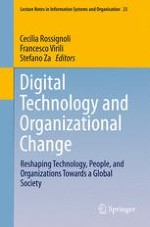2018 | OriginalPaper | Buchkapitel
Time Accounting System: Validating a Socio-technical Solution for Service Exchange in Local Communities
verfasst von : Tunazzina Sultana, Angela Locoro, Flávio Soares Corrêa da Silva
Erschienen in: Digital Technology and Organizational Change
Aktivieren Sie unsere intelligente Suche, um passende Fachinhalte oder Patente zu finden.
Wählen Sie Textabschnitte aus um mit Künstlicher Intelligenz passenden Patente zu finden. powered by
Markieren Sie Textabschnitte, um KI-gestützt weitere passende Inhalte zu finden. powered by
